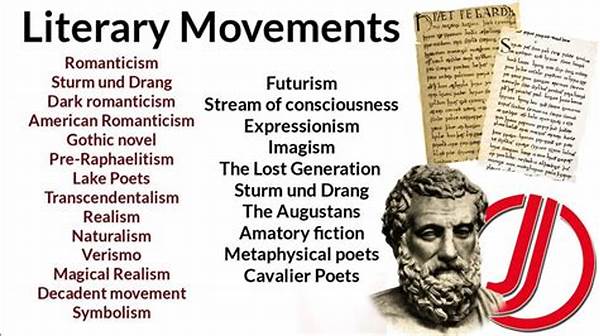Literature has the power to transform minds, ignite revolutions, and spark dialogues that transcend time and space. The tapestry of literary history is woven with various influential literary movements and authors who have left an indelible mark on the world. These thinkers and writers transcended conventional boundaries, altering the landscape of literature and often challenging societal norms. Each movement brought fresh perspectives, critiques, and stories that enriched the cultural and intellectual framework of their times. Let’s journey through the corridors of literary history to explore the impact and nuances of these movements and the minds behind them.
The Renaissance: A Rebirth of Thought and Expression
The Renaissance, a revered chapter in art and literature, denotes a period when Europe witnessed a resurgence of cultural and intellectual awakening. It kindled a renewed interest in the classics of Greek and Roman antiquity. Influential literary movements and authors like William Shakespeare, Dante Alighieri, and Miguel de Cervantes emerged, pushing humanism to the forefront of their works. Their writings forged a bridge between the medieval past and the modern future, capturing the complexities of human nature in an evolving world. These figures pioneered themes of individualism, embracing beauty and knowledge, thereby inspiring countless generations. As one of the most influential literary movements, the Renaissance set the precedent for the flourishing of ideas and creativity, highlighting the paramount significance of literature in personal and societal growth.
Romanticism: Embracing Emotion and Nature
Romanticism emerged in the late 18th century, rebelling against the rationalism of the previous era. This influential literary movement celebrated emotion, nature, and individualism. Authors like Lord Byron and Mary Shelley explored human passions and the sublime beauty of nature. Their works laid the groundwork for future literary exploration.
The enchantment of Romantic poetry and prose emphasized emotion, turning away from the cold reason of the Enlightenment.
Romanticism painted vivid pictures of the natural world, emphasizing a deep connection between humanity and nature.
This movement celebrated individuality, encouraging authors to explore personal experiences and emotions in their works.
Romantic authors believed in the innate goodness of humanity, opposing the industrializing world of their time.
Influential literary movements and authors of the Romantic period left an enduring legacy, continuing to inspire creativity and introspection today.
Modernism: Breaking Traditions and Exploring New Forms
Modernism, characterized by a deliberate departure from tradition, marked the late 19th and early 20th centuries. Influential literary movements and authors of this era, such as James Joyce, T.S. Eliot, and Virginia Woolf, sought new expressions of human experience. Modernist writers experimented with fragmented structures, stream-of-consciousness narratives, and unconventional poetry. They captured the disillusionment following World War I, probing themes of isolation, alienation, and the complexities of modern life. These authors revolutionized the way stories were told, challenging readers to consider new perspectives and question established truths. The Modernist movement, with its focus on introspection and innovation, continues to resonate in contemporary literature, echoing the ever-evolving nature of human expression.
Postmodernism: Questioning Reality and Authority
In the latter half of the 20th century, Postmodernism emerged as a response to Modernist ideals. This influential literary movement challenged notions of objective reality, authority, and conventional story structures. Influential literary movements and authors like Thomas Pynchon and Margaret Atwood embraced metafiction, pastiche, and intertextuality. Postmodernism blurred the lines between fiction and non-fiction, prompting readers to question the nature of truth and narrative authority. These authors deconstructed traditional storytelling, offering a kaleidoscope of perspectives and voices that reflect the complexities of the modern world. Through playful, self-aware narratives, Postmodernism invites readers to engage in a dialogue about the nature of literature and its role in society.
The Harlem Renaissance: A Flourishing of Black Literature and Culture
The Harlem Renaissance was a vibrant cultural movement in the early 20th century, centering on the African American experience. Influential literary movements and authors like Langston Hughes and Zora Neale Hurston showcased the richness of Black culture through literature, music, and art. Their works explored themes of identity, race, and resilience, breaking down racial barriers and fostering greater understanding. The Harlem Renaissance gave voice to a marginalized community, celebrating Black identity and creativity. This movement laid the foundation for future generations of African American authors and became a pivotal moment in the ongoing struggle for racial equality and cultural recognition.
The Beat Generation: A Rebellion Against Convention
Emerging in the 1950s, the Beat Generation was a countercultural movement that rejected the conformity of post-war American society. Influential literary movements and authors like Jack Kerouac and Allen Ginsberg explored themes of spirituality, freedom, and non-conformity. Their stream-of-consciousness writing style and exploration of alternative lifestyles challenged societal norms, advocating for personal liberation. The Beat Generation inspired a spirit of rebellion and authenticity, resonating with those seeking meaning in a rapidly changing world. Their work paved the way for future literary movements that continued to question and redefine cultural and artistic norms.
Summary: The Enduring Legacy of Literary Movements and Authors
Throughout history, influential literary movements and authors have shaped the course of human thought and creativity. From the intellectual awakening of the Renaissance to the emotive explorations of Romanticism, and the innovative storytelling of Modernism, each movement brought fresh perspectives to literature. Postmodernism continued this legacy, challenging perceptions of reality and narrative. The Harlem Renaissance and the Beat Generation highlighted the importance of diverse voices and cultural expression. Each of these movements contributed to a rich tapestry of human experience, reminding us of the power of literature to inspire change, foster understanding, and reflect the complexities of the human experience. As we continue to explore and celebrate these influential literary movements and authors, we recognize their enduring impact on literature and society, providing a timeless source of inspiration and reflection for future generations.
